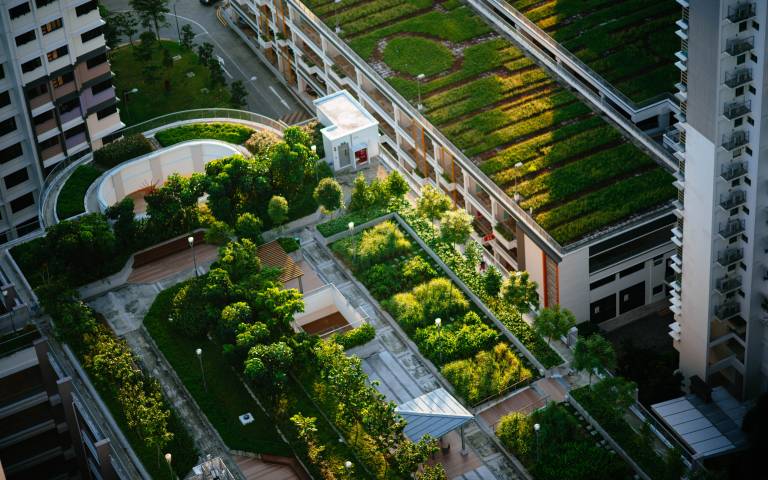4-year UCL PhD studentship in Urban Climate and Energy System Resilience and Adaptability
17 May 2022
Energy Resilience and the Built Environment (ERBE) CDT, UCL’s Institute for Environmental Design and Engineering in partnership with Hoare Lea are seeking applications for a fully funded Studentship in “Urban Climate and Energy System Resilience and Adaptability”

The project aims to explore the interactions between energy and climate at the urban scale, to find early stage design solutions which will increase resilience and adaptability.
Supervisor: Dr Esfand Burman of UCL Institute for Environmental Design and Engineering, and Dr Samuel Wilkinson of Hoare Lea.
Funding: The studentship will cover UK course fees and an enhanced tax-free stipend of approx. £19,000 per year for 4 years along with a substantial budget for research, travel, and centre activities.
Fees: ERBE CDT has very limited funding for applicants requiring coverage of overseas fees. We advise all interested applicants to be familiar with the changes to EU and International Eligibility for EPSRC/UKRI funded studentships
Dates: 4 years from September 2022
Deadline for applications: Sunday, 12th June 2022 @ 23:59 (UK time)
Interviews week commencing: TBC
Context and Project description:
Energy systems and the climate are changing rapidly in the UK, requiring dense urban environments to evolve quickly over the coming decades. Resilience is the ability to respond to, cope with, and recover quickly from system change or shocks – whilst adaptability relates to the capability to change in response to new factors. Increased resilience and adaptability are both urgently needed in our built environment from an energy and climate perspective.
Adaptability and resilience can be embedded in our cities through interventions such as better building design, integration of nature-based solutions, promoting behavioural change, smart metering and control, holistic systems-thinking, and utilisation of new energy generation and storage technologies. Buildings have a key role to play in the wider energy system as an essential component in our national decarbonisation strategy towards net zero, and in contributing to the resilience of local, regional, and national energy system.
This project will explore the interactions and integration of these interventions in real-world building and urban design applications, focusing on early-design stages.
Studentship aims:
The project aims to explore the interactions between energy and climate at the urban scale, resulting in design and engineering solutions which can increase resilience and adaptability.
We foresee that this would involve a review of the energy generation, storage, supply-demand, metering and control landscape, nature-based solutions, climate forecasts and other potential design or social interventions. A modelling approach will be employed, combining environmental micro-climate, building level and local energy system simulation to assess different resilience and adaptability scenarios. The co-benefits will be quantified, such as the effect of green infrastructure on building heating/cooling demand, or the effect of a shift to electric vehicles and active mobility on urban heat island.
The successful candidate will work with internationally respected researchers, supported by their supervisors and by the vibrant and skilled research teams undertaking cutting-edge research in this area. They will also join the wider ERBE cohort (Energy Resilience and the Built Environment Centre) to benefit from high-quality training and support throughout their PhD study.
Person specification:
The applicant should have an interest in climate adaptation and nature-based solutions, environmental simulation, energy markets and technologies, building engineering and urban design, and systems modelling. Strong quantitative skills are necessary and graphic, verbal and written communication skills are desirable.
A minimum of an upper second-class UK Bachelor’s degree and a Master’s degree, or an overseas qualification of an equivalent standard, in a relevant subject, is essential. Exceptionally: where applicants have other suitable research or professional experience, they may be admitted without a Master’s degree; or where applicants have a lower second-class UK Honours Bachelor’s degree (2:2) (or equivalent) they must possess a relevant Master’s degree to be admitted.
Applicants must also meet the minimum language requirements of UCL
Applicants should be familiar with the changes to EU and International Eligibility for UKRI funded studentships.
How to apply
Please submit a pre-application by email to the UCL ERBE Centre Manager (bseer.erbecdt@ucl.ac.uk) with Subject Reference: 4-year PhD studentship in Urban Climate and Energy System Resilience and Adaptability
The application should include each of the following:
1) A covering letter clearly stating why you are applying and how your interests and experience relate to this project, and your understanding of eligibility according to these guidelines: EU and International Eligibility for EPSRC/UKRI funded studentships
2) CV
3) Complete the CDT EPSRC fees background and EDI questionnaire via the linked Microsoft Forms.
Only shortlisted applicants will be invited for an interview.
- For the interview shortlisted candidates will be asked to show proof of their degree certificate(s) and transcript(s) of degree(s), and proof of their fees eligibility.
- The interview panel will consist of the project’s academic supervisors at UCL, industry supervisors at Hoare Lea and a representative of the ERBE CDT Academic management. The interview will include a short presentation from the candidate on their ideas of how to approach this PhD project.
- Following the interview, the successful candidate will be invited to make a formal application to the UCL Research Degree programme for ERBE CDT.
Deadline for applications: Sunday, 12th June 2022 @ 23:59 (UK time)
Interviews week commencing: TBC
For further details about the admission process, please contact: bseer.erbecdt@ucl.ac.uk
For any further details regarding the project, contact Dr Esfand Burman, esfand.burman@ucl.ac.uk
You will be undertaking this project:
- In UCL at the main (Bloomsbury) campus as part of the new EPSRC-SFI Centre for Doctoral Training in Energy Resilience and the Built Environment (ERBE CDT). This is a collaboration between UCL, Loughborough University and Marine and Renewable Energy Ireland (MaREI). For more information please see http://erbecdt.ac.uk
- Hoare Lea’s London office is based by Kings Cross, a short walk from UCL’s Bloomsbury campus. The candidate will be primarily collaborating with our Sustainability and Applied Research & Innovation (ARI) teams
Image credit: Photo by CHUTTERSNAP on Unsplash
 Close
Close

